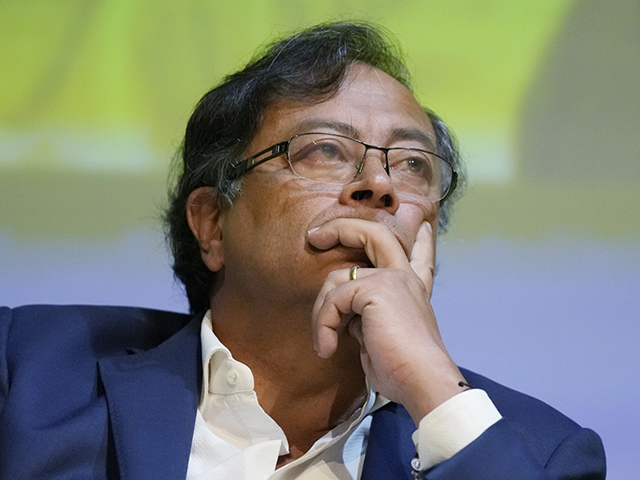Leftist ex-guerrilla member Gustavo Petro, one of the two remaining candidates in next week’s Colombian presidential election, has expressed his desire to put an end to the country’s oil and sugar industries if elected president.
Petro has issued calls to transition Colombia towards a “green” path that would see it stripped of its energy independence.
Crude petroleum and coal are Colombia’s two main exports, representing more than $11.5 billion of the nation’s $32.2 billion in exports during 2020. Stopping oil and gas drilling in Colombia would strip the South American nation of the energy self-sufficiency that it attained in 1987 and have a negative cascading effect on Colombian citizens, who would see fuel prices double and natural gas bills quintuple.
Petro, the former mayor of Bogotá and ex-member of the Marxist M19 guerrilla, won the first round of Colombia’s presidential race next month. He will appear in a runoff on the ballot against one other candidate, businessman Rodolfo Hernández, on June 19.
At a campaign rally last month, Petro cataloged coal and oil as “poisons” akin to cocaine and has promised that, if elected, his first action as president would be “the cessation of oil exploration contracting.”
Felipe Bayón, the CEO of the Colombian state-run Ecopetrol SA oil company, stated in February that an abrupt end to Colombia’s oil and gas drilling under a hypothetical Petro presidency would be challenged in court.
“So even if allegedly he can come in and change everything, there will be challenges in the legal system not only from us but many people,” Bayón said.
In an effort to curb inflation (which reached 9.23 percent in April), Colombia’s energy ministry decided to not raise fuel prices during the month of May, leaving it at 9.03 Colombian pesos per gallon ($2.39).
The Colombian Petroleum Association has forecasted that reducing or outright stopping investment in Colombia’s oil industry would also have consequences in the production of natural gas. According to its forecast, a weakened Colombian oil industry would force the nation to import natural gas in 2026 and petroleum in 2028, causing $13 billion in losses and putting more than 40,000 public jobs at risk — estimating $77 billion in losses over a ten-year period.
Petro’s crusade against fossil fuels and desire to steer Colombia away from them was backed in an open letter published online in May by leftist personalities such as Noam Chomsky and Naomi Klein. Currently, Colombia exports approximately 200,000 barrels of oil per day to the United States, with plans to increase the amount by 40,000 by the end of 2022.
Petro also intends to create a leftist “anti-oil bloc,” potentially with Chilean President Gabriel Boric and Brazilian ex-president and current presidential candidate Luiz Inácio Lula da Silva, should the latter win that country’s election this year. The proposed bloc would seek to steer away from the oil economy and replace it with “economies that are decarbonized, productive and based on knowledge,” Petro said in an interview with Bloomberg in January.
Colombia’s sugar cane industry is another sector that Petro has targeted. A hypothetical Petro presidency has Colombia’s sugarcane sector on alert, given the history of statements Petro has expressed against Colombia’s sugar industry in the past.
During his 2018 presidential campaign, Petro expressed his intention to expropriate the lands where the Incaua Sugarmill operates to give them to farmers. His statements drew the criticism of former president Álvaro Uribe Vélez (2002-2010), who compared Petro’s intentions to the expropriations carried out by the socialist regime of Venezuela under Hugo Chávez and Nicolás Maduro.
“Dr. Gustavo Petro wants to turn the sugar mills of Cauca into a mess like he turned the companies owned by Bogotá. Chavez’s expropriating fangs come out even if he wants to hide them,” Uribe wrote.
In 2019, Petro described sugar as more dangerous than cocaine.
“Did you know that sugar is a much more harmful drug than marijuana or cocaine? We have 250,000 hectares planted to produce one of the worst drugs in the history of mankind: sugar;” he wrote on Twitter.
Petro received severe backlash for his comments at the time from the sugar union and political leaders of the southwestern Cauca Valley Department, where Colombia’s sugarcane industry is based.
“Comparing sugar with marijuana or cocaine and saying that the granules are more harmful than those psychoactive substances is absurd and also disrespectful,” Colombia’s union leaders responded in 2019.
Following the backlash, Petro doubled down, declaring sugar to be the “the most dangerous drug in history” on June 10, 2019.
Petro’s past sugar controversies and concerns over the fate of the industry’s 300,000 jobs resurfaced during the 2022 Colombian presidential campaign due to statements given by Petro’s vice-presidential nominee, Francia Márquez in 2021.
“People here in the geographical valley of the Cauca River cutting cane, we ceased to be owners of the land to become enslaved in some way to the sugar mills and the sugar industry of this region,” Márquez in March.
According to data from the United States Department of Agriculture, Colombia exported 56,750 metric tons (MT) of sugar to the United States in 2021 as part of the U.S.-Colombia Trade Promotion Agreement (CTPA) signed between both countries in 2012, while forecasting that Colombia’s sugar production will remain at 2.3 million MT thorough 2022.
Christian K. Caruzo is a Venezuelan writer and documents life under socialism. You can follow him on Twitter here.

COMMENTS
Please let us know if you're having issues with commenting.